 Don't worry. While this is partly about an Australian Cardinal currently in Rome, it's not going to be an anti Catholic church rant. I'm still safely on brand. No, no, no, this is more about how music and public consensus are making their contributions to justice. Or one Aussie (ish) musician and a lot of generous donators are at least. See, safely on brand given I'm an Aussie based in Italy with a thing for all things cultural. Sometimes though, culture bleeds into deep, dark places. Places that we don't necessarily want to go to, but for our moral obligation to do so. Like, to Melbourne, say. 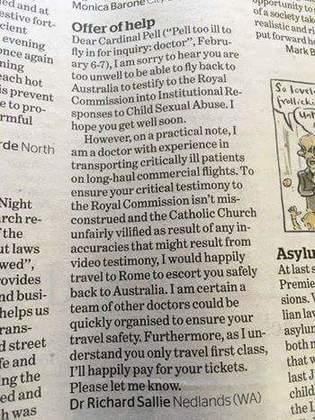 Like other places where Catholicism has reached out into, Australia has some Catholic history. It has produced a saint (St. Mary MacKillop), hosted a few papal visits, has some rather nifty looking churches/cathedrals and, like most other places in the Western world, an ever shrinking number of people who identify as being Catholic. That said, for a small country, Australia punches above its weight at the Vatican, thanks especially to Cardinal George Pell. Pell's name was briefly bandied about before PF was chosen as Pope. (PF=Pope Francis). PF, being the good sport he is, later put Pell on the advisory group dedicated to reforming the Catholic Church. Since then, Pell has also gone on to head the IOR - commonly known as the Vatican Bank. His job there has been to bring it into line with international banking practice and transparency. Not an easy thing to do with all that internal opposition and secrecy, but it's been a role made even more difficult with the revelation of Pell's own lavish spending. Tusk tusk. Like other places in the Catholic world, there's a seedy, darker underside to its legacy in Australia. That one that makes us shudder. The one linked to child sexual abuse at the hands of members of the cloth. And much like a lot of other places in the Western World, the Church's attempts to sweep things under the carpet in Australia have only contributed to a problem that won't go away. Even if you could argue that the 15,974km between Melbourne and Rome offers some form of distance from the problem. What does Pell and Rome have to do with this? Well, he spent decades as the top ranking official in the Catholic church in Australia. From humble beginnings in Ballarat, he went on to hold the titles of the Archbishop of Melbourne, and later, Sydney before being called on to Rome. His decades long involvement in the Australian church's handling (and alleged cover ups) of child sex abuse has been, and continues to be the subject of investigation. There's quite a lot of documented information about Pell's responses and the initiatives he led if you care to look for it online. A lot of the documentation now publicly available is the result of two State based parliamentary inquiries into the issue, and Pell's own testimony. Different countries have their own mechanisms and legal processes, and in Australia, the holy Grail of these is called a Royal Commission. It takes things to a national level. And right now, there's one now currently under way in Australia - established to take a wider look into institutional child sex abuse and not, it should be said, as it only relates to the Catholic Church. It's investigation is broader than just one church. For some time, Pell, still in Rome, has been called to testify (he has previously testified at state inquiries and to the commission back in 2014) in Melbourne. But the Cardinal's lawyers have continuously stalled attempts at getting him to testify again at the current Royal Commission. They say Pell's medical condition precludes him from making the long haul journey back to give evidence, so, you know, can't he just give his testimony by video link? Hello? Have you ever used the internet and the phone system in Italy? It is shite! Complete shite! You'd get better, clearer international communication using smoke signals. Now legal types who are working at Royal Commission level don't put up with this kind of nonsense for long. They get narky and it can only mean eventual bad things for Mr. Pell if and when he graces them with his presence. Which they expect him to do, not only to help them get to the bottom of things without the possibility of troublesome video links but also as a mark of respect to the church's victims. The pressure is on Pell and his legal team even if it looks likely it's going to be a via satellite affair in the end. But if you think the judiciary gets narky when their big event has its authority undermined by someone, don't underestimate the Australian public's response. One of the major Melbourne newspapers - a Murdoch paper - has printed an article that accuses the public of conducting a giant witch hunt on Pell. It's written by Andrew Bolt, one of Australia's highest profile commentators. Conservative commentators. But those kinds of editorials/articles are incredibly out of step with the Australian public on this issue. Aussies, by and large, are furious that Pell's responsibilities and moral obligations to victims and to the Commission can be fobbed off with a sick note while he conceivably goes about his daily routine in Rome. Thankfully, Aussies are an inventive bunch and not all conservatives. Check out the image above taken from another of the letters pages in an Australian newspaper. (somebody sent it to me via Facebook, apologies for the lack of attribution!) That laconic, Australian humour and straight forward no bullshit attitude is one of the things that I love the most about Australia and Australians. It's that kind of transparency that you can only hope that Pell is pouring into the IOR. But the thing is, with regards to the Church's cover ups, its the perception of a lack of historic (and present) transparency which seems to be at the heart of the issue. Not being able to fly back to give evidence doesn't help the perception. So, what other recourse does the public have? Well, the court of opinion is a powerful thing. The following video by Tim Minchin, a comedian/singer/non morally bankrupt kind of person has hit the web over the last few days. It's Minchin's own contribution to a crowd funding campaign that is underway: and, his own personal call for Pell to fly back to Melbourne and give evidence. Crowdfunding? Yes. You heard right. Because, some bright spark figured that if Pell wouldn't come to the hearings, then they'd send the victims to Rome instead. The face to face testimony, they note, is part of the healing process. So, even if Pell gives video evidence later in the month, campaigners want the chance to confront him in person. With Minchin's help, the campaign has already doubled its target. Brilliant. More here.
0 Comments
 I just spent the last month back in my hometown of Melbourne. I have to say aside from having the chance to spend time with family and friends, and to soak up the Australian summer amidst the backdrop of events like Midsumma and the Australian Open, being back in Australia was like a breath of fresh air. This is my sixth year in Italy, and getting on the plane to come back here was difficult, not just because I was coming back to winter, but also because it meant re-entering the fraccas that is the never ending polemica. Today is Australia Day and there are some major ongoing issues that need confronting in Australia including the divide between rich and poor, ongoing racism and a growing anti Muslim stance, but for the most part I think Australians are a tolerant and respectful bunch. Differences of opinions are rarely the source of deep divisions in society and in the media. It's not often a case of us versus them, let's just say. Here in Italy, things are different. Italy, in my mind, has to be one of the capitals of divisive thought. A fractured, splintered media makes a huge contribution to this, as does the existence of organizations like the Catholic Church. There are so many entrenched, vested interests in this country that it feels as if Italians are stuck under a net so intricately weaved that if they ever make it up to the surface, the only thing they are capable of doing is taking shallow breaths. I'm Australian and my partner is Italian. We've been together for more than five years. The thing is we come from two opposite spectrums of the world: I'm from the new world and he's from one of the historic centres of the world as we know it. Yet, as an Australian and an Italian we both share one thing in common. We both come from the last Western countries in our cultural worlds that don't offer equality marriage. Italy is the last major Western European nation that doesn't recognise same sex unions, and Australia is the last major country in the Anglosphere that hasn't enshrined things in law. Now, don't get me wrong. It's not like I want to get to married. In Australia, my long term relationship with my partner is technically recognised to some extent by the existing de facto laws there. But not wanting to get married and not even having the choice or right to choose really infuriates me. What do you care? You might think. You're happy - you've been together for five years, what will a piece of paper change? Nothing. Not on a daily basis. But not all people marry because they want to feel different about each other. Some people marry for practical reasons. And married friends who have been together less time than I've been with my partner have a host of financial, employment and medical rights that we can only dream about. What do you care? Well. Let me illustrate how this works. You see, I come from a state in Australia called Victoria. Although Australia doesn't offer same sex unions or marriage, Victoria at least recognises same sex unions from other countries, has just passed same sex adoption laws and at the moment offers a register (although as it is purely symbolic why would I bother?). And if something happens to you, you need the protection of the law. As a human being, if something happens to me or my partner, I would like to think that either one of us would have the support and the right to decide what happens, what needs to be done, and that the other will be protected. For those who aren't able to comprehend what this means on a human basis, Iet me draw your attention to this recent and shocking set of events that occured in South Australia, Victoria's neighbour state which doesn't recognise foreign same sex unions. This is the senseless, inhumane setting in which same sex couples exist in many countries. Even with the protection of the law it's not a fun and games scenario. So, having travelled over 30 hours to get back to where I am now based, two hours after landing at my local airport, I found myself in a piazza in Lecce at a demonstration. And why was I there on Saturday? Because this week, the Italian parliament is due to debate the Renzi government's bill to introduce same sex civil unions. The bill is likely to be defeated? Why? Because of a provision for same sex couples to adopt which has courted the ire of the Catholic Church which is deeply entrenched in the Italian political system (and surprisingly, also incredibly powerful on the Australian political right- hence the failure to legislate despite overwhelming public consensus). Now I am all for everybody having their own opinions. I believe it is your right as a persoon to choose not to agree with certain aspects of a wider society. I get that. I don't agree with it, but you as a person are entitled to your opinion. But in my books, what nobody is entitled to is the denial of an identical set of rights to another group of people or individuals. I respect and value your life and I expect you to do the same with me. And as a result I am infuriated by news in recent days that the Catholic church speared Family Day demonstations (as cynical a name as possible for an event which seeks to diminish any idea of a family that doesn't correspond to what the Catholic church defines as 'normal') are privvy to yet more rights at the expense of others. This time, transport group Italo is offering discounts to those in Italy who would like to attend the Family Day demonstration this coming Saturday in Rome. This on top of local churches who are offering a 50 euro picnic+demonstration package to parishioners who agree to attend the marches. Even the city of Rome's public transport group is offering discounts. I made my own way to the demonstration on Saturday. I didn't get offered a discount for that, and I attended in part because I demand the right to be treated equally under the law as anyone else. What I don't appreciate is that aside from the ridiculous hipocrisy of the organisers of Family Day (the idea of a twice divorced, philandering politician and priests who have no idea what modern life resembles), their push to ensure that the GLBT community continues to live on the fringes of what is acceptable in society and by law is being backed by both public and private organizations. I won't even go into the idea that some churches are even offering a cash handout to those who are willing to head to Rome for the day. All that is left to ask is, is this the kind of world that we should be living in today in 2016? How is this acceptable in any place in the world? Appalling. I'm not anti Catholic, but I tell you what, living in Italy really makes me wonder whether common sense simply suggests I should be. I often get asked what life is like for the gay community in Italy by friends abroad. People assume that because it's a Western European country that life is reasonably progressive here, as it is in neighbouring countries like Spain, Germany and The Netherlands.
Had they asked me in the month of July or August I'd probably be too distracted by the good looking locals, the gay beaches and the brilliant electronica parties to think too much about the situation. But the month of June has delivered with it all the answers we need for the question at hand...read on and hopefully I'll have given you a pretty comprehensive snapshot of what the situation is like here. From the outset let me say that I am not an activist. I probably quite naively believe that there is room for everyone in a society, even if reality continues to prove me wrong. But I have a brain and a conscience which is more than I can say for some parts of the wider community, and community leaders in particular who always seek to divide. Earlier this month Rome celebrated its annual Pride event with crowd estimates ranging between 500-600k. Alongside Milan's Pride, Rome consistently attracts huge numbers in part because pride there acts like a magnet for many people in the south of Italy. While a number of southern cities are now hosting events (including Naples, Palermo, Bari and my new base of Lecce), the LGBTQI community still has less of a presence in the south and therefore those who want to march often do so in the protection of the country's capital. In the country's capital and across its political offices, the current centre-left government, run by Matteo Renzi is busy trying to enact a number of huge reforms including the reforming of the public school system and the drafting of legislation to introduce civil unions on a national scale. Renzi's goal is to have the legislation enacted as soon as possible - it's been one of his platforms since coming to power - and the idea is that the civil unions will in the main part replicate the system used in Germany where the protections are all but identical to marriage but without that pesky word being mentioned and, as in Germany, without provisions for gay couples to adopt. Italian opinion polls show that despite the tentacle like reach of the church, the majority of Italians are in favour of civil partnerships. Any political organisation worth its salt has done its own polling to confirm this trend, and as such, even the usual suspects on the right are not demonstrating opposition to granting the right of legal acknowledgement to the unions, even if they are playing the political game and obstructing thousands of points in the draft legislation to slow things down. Having realised that the public tide has turned, the right is shifting its stance. The new line is that on the whole, they begrudgingly support civil unions (after all, their constituents are already on that page), so the debate has shifted towards gay parenting and the alleged perils that Italian children and families face, and its an attack that is being propelled by the usual suspects. This month, a Family Day march was convened by pro-life and pro-family groups and the Catholic church and attracted a crowd in Rome for which estimates ranged between 300K and 1 million people. Even the Catholic press cited the 300K figure, but suffice to say the "Difendiamo i nostri figli" (Protect our Children) march drew in the parishioners in much the same way that occurred in France when gay marriage was legislated. This after months of lobbying and preparation from the network of churches and parishes that dot the land. Stepping into a church the other day to photograph the art, I was shocked that there was actually a poster inciting people to join the march. But this new pope? Isn't he the good guy in all of this? Well, some will have you believe so, and the church's involvement in the march was more grassroots in nature, with the Bishop's Council not formally being involved. That said, any negation that the church was involved would be a blatant lie (as I said, I spotted the poster in a church, and it was a mass produced poster some 600km away from the march itself). But Francis has actually been doing a lot of late to fan the fires and to stoke the church's underlying agenda. While the perception is that he's gay friendly, the reality is that the Church's stance has not changed at all, and that he in fact is opposed by large factions within for conceding any public ground on the matter. As such, he has been releasing well timed statements to reinforce the Catholic church's fundamental belief in the traditional family. Every family needs a mother (female) and a father (male). Any sentiment to the contrary is unacceptable. Period. And so, in sensing that civil unions are now politically untouchable, talk has shifted towards the idea of family and gender as being the perils that civil unions will bring with. The march, although ostensibly one against civil unions, was presented as a march for traditional values, attracting its audience by opposing the idea of gender ideology that conservative groups believe is being piloted in Italian schools as part of the education system reforms. What they are mistakedly, but conveniently, referring to are a series of initiatives based on improving social cohesion and harmony through the use of materials which challenge stereotypes. Materials that, the likes of which have been in circulation in Western schools for decades. Materials like Salvero la Principessa which champions the use of words over violence, or Zaff, or E Con Tango Siamo in Tre, children's books which are designed and written to help children overcome their prejudices towards minority groups. These titles sit alongside conventional materials in some libraries in an attempt to acknowledge the growing diversity of society, but that right wing groups and certain politicians are demonizing, suggesting that there is no place for them in schools, and no space for these ideas to be considered. Ultra conservative media outlets like Breitart (like Fox but exotic) and the dozens of Vatican connected media outlets will have you believe that these materials are indoctrinating children into cross dressing and, you know, basically trying to destroy the entire society because they are an affront to the church's agenda. And what of Arcigay, the national LGBTQI group that attracts so much foreign press? Aren't they using their resources to help the government sensitize the public to the nuances of the debate? Well, although they have chapters in many Italian cities, (some of which are more active than others), much of the gay community here views them as being inneffective, so other groups like Mario Miele, or even much smaller groups like LeA- Liberamente e Apertamente here in the relatively small town of Lecce are using their own resources to strike back at the misinformation that is polarising the community on a piecemeal scale. It's a long running debate which, in shifting the focus away from gay marriage, is tapping into another form of ingrained discrimination that the LGBTQI community has yet to overcome. LGBTQI people are conditioned into thinking certain things by society, one of which is that they are not entitled to become parents. There's a self flagellation that occurs suggesting that the ingrained religious beliefs are very hard to overcome in the quest to get over self loathing, especially when society as a whole is doing little to counteract it. We've seen celebrity scalps in the debate already: Dolce and Gabbana waded unnecessarily into the debate in a classic case of this self-perpetuating loathing, and are now paying for it at brand level (good luck to them, as tax evaders, designers and self conflicted social commentators I can do without them). The children in danger argument has though, infiltrated the mass media. Even local starlets like Lorella Cuccarini (I know, that name means nothing to me either) are becoming embroiled in a debate which substantially seems to be reinforcing the idea that, yes, we'll concede on partnerships, but in doing so, you, the gay community need to acknowledge that whatever you do you won't be seen as part of any family unit, and your yet to be enshrined rights have no place in our education system, nor should they be acknowledged in any other way. This is the case for adoption. But in a way it also addresses the consensus towards members from the GLBT community who have children of their own. (Surrogacy and assisted fertility is not provided to singles in Italy, though many hop over to Spain or other nearby countries to get around the law). The overall message. Strides are being made and Italy (like my homeland Australia) will inevitably get on the right page of history. But before that happens, or perhaps while it does, groups like the church will continue to use kids as pawns in their own political agendas. Is their goal to obstruct the presence of non nuclear families so that they can instill just enough hate and self loathing in the next generations as well? That's my guess. What's yours? 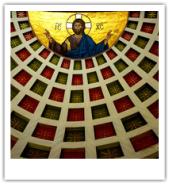 I COULDN'T get my financial act together this Easter to escape the throngs who are descending on Rome for the Holy Week. This is my third consecutive Easter in Europe, but the first that I find myself in Rome, as much as I had wanted to escape. Perhaps I will, even if just for a day or so, but at the end of the day it doesn't really bother me. Rome is big enough to be able to avoid a lot of the crowds who come in to soak up the atmosphere and to feel physically closer to God. Last week I went to a village mass service in the far south of Lazio. I tagged along with some devout relatives and although it wouldn't have been my way of choosing to spend a Sunday morning, I didn't find it offensive. I love to observe people and although the service was all fine and well, it was more interesting for me to watch the latest generation of teenagers flirting in the gallery where I was sat. When they eventually bored me I started to focus on the architecture of the church, which felt like a modernized minimalist sixties building, just done on the cheap. The other day I was thinking about how this city in particular has come to be associated with Christianity, and how ostensibly, it's an association that began as in import of a foreign culture or tradition. Of course, Catholicism developed into something completely of its own here, but I couldn't help but think about the way in this country in particular, people picked up the ball and ran with the idea, creating a huge visual and structural heritage and iconography along the way. It would be like South Africa deciding wholesale that it was going to be Buddhist and then over the course of a couple of millenia reshaping the land so that it was completely dotted with temples, Buddhist icons on street corners, mini shrines built into the facades of apartment buildings. It's fascinating really. A cursory check will tell you that there are almost 1000 churches in Rome. This is an interesting figure, because it is well documented that during the Roman era the city's population peaked at over a million, making it at one stage the world's biggest city, but with the fall of the Roman empire it contracted to less than 50,000 right through until the mid 1900s when Rome's population first returned to seven figure numbers. Christianity didn't become the official religion in ancient Rome until the time of Constantine, which was in the later part of the Roman era, long after the Tetrarchy had been established, splitting Rome's power base. The majority of Rome's churches date long after the Roman era, and arose with the shift of Rome's history towards the papal state. If you take a walk around the city centre, you will find church after church, often one annexed to the other, and it would take some imagination to think of how these would all be filled with parishioners and not with bureaucrats. But the pilgrims still come, and this city has a fantastic legacy of Christian inspired cites that run alongside its Roman and Etruscan heritage. The point for me this weekend will be to find a way to avoid too many of those 1000 churches and the thousands of pilgrims who, if not here to fill the temples are here to fill the adjacent piazzas. 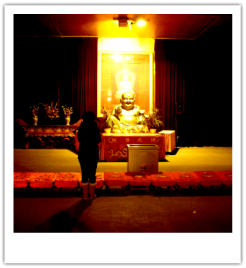 The moment you introduce the idea of power into any context, the potential for corruption and abuse is limitless. We may breathe air and live on bread, but we live in a world of numbers. Numbers are loaded with symbolism, and carry significance and power. They are often wielded to demand all kinds of preferential treatment and privileges by all sorts bodies and organisations that purport to represent people. Sometimes numbers are not always representational; we under estimate and over estimate things on a regular basis, and like stocks on the exchange, value can be relative to any one single day. I love the Towleroad blog for its round up of world news and gay issues. It recently reported that a fringe group in the US called 'One Million Moms', which one commentator on the site rightly noted would be more appropriately titled 'A few thousand women who can't count', attempted to start a viral campaign against JC Penny for what they deemed was the organisation's inappropriate use of Ellen DeGeneres as the brand spokesperson given that she was a lesbian and represented non Christian values. I know many gay people who consider themselves Christian, or Buddhist or Muslim and have no issue in maintaining their values despite how their religions may interpret their teachings or doctrines, good or bad. I think they have grown tired of always having to defend their own faith because of the way other people with similar religious inclinations interpret their own faith. And to JC Penny's credit, they stood by Ellen and ignored the threats of boycott if Ellen wasn't from her post. Despite that attempt, One Million Moms (their count, not mine) again have expressed outrage, staging an online campaign against Toys R Us for stocking an issue of the famous Archie comic series, whose recent issue depicted a same sex marriage celebration on its cover. Its one thing to ignore or choose not to purchase a product. It's a capitalist idea, and succinctly, the numbers will speak on their own behalf. Its another thing entirely to threaten mass boycotts. Social media is a powerful tool, one which can be increasingly exploited for good or bad. People power via the internet is fast defining this new decade and powerful (and not so powerful) lobby groups are setting the scene. Whilst to some extent these online petitions are a logical way in which people can create debate, express themselves and find comfort in like minded company, when they are used to curtail the hard won freedoms of other social groups I find them incredibly distasteful. Click on READ MORE to continue the post  Travel anywhere in Italy and you are likely to be bombarded with Catholic iconography of all sorts. Icons can be found on street corners, in front of apartment buildings, in advertisements and free flyers for music and aperitif events...anywhere really. I love a good spin on the classics, especially when things are done with tongue in cheek. As someone who grew up outside of Italy, I have a sense of detatchment about the iconography and the church. I studied art history at university and can marvel at the beauty of art and architecture which was created in line with religious purposes and idealogy, but that is where I draw the line. In Italy, Italians aren't as religious as the world would have you believe. It's just that the ubiquity of imagery, centuries of tradition and the looming influence of the Vatican continue to hold what is ostensibly a political hold over the country. A recent furore here erupted with the widely publicised ''news'' that the Vatican, even during these times of financial crisis, receives tax breaks and benefits that estimates amount to up to 3 billion euro per year. This is largely because as a ''non commercial'' entity it is free from taxation. Sounds good in principle, but the non commercial business activities go far and beyond what one might expect from a religious organisation; beyond the schools, churches and clinics, a little searching will reveal that the Vatican's fortune comes largely from revenue deriven from commercial leases of its extensive real estate portfolio; retail stores, apartment complexes, hotels...all of which are done tax free. There is a resentment that the Vatican profits from a portion of what taxes Italians actually do pay, especially when the Vatican is seen to use its economic and social might to help control and steer government policy in the same way that Conservative groups do throughout the Western World. How this will turn out, no one knows. A rather brilliant editorial piece in recent days spelt out the machinations of the government's current approach to its economic woes. When commerce and spirituality meet, things usually get ugly, same for when they collide with government. Thank God (sorry), that we always have the stand alone nature of icononography to fall back on. |
Dave
|
|
|
Dave Di Vito is a writer, teacher and former curator.He's also the author of the Vinyl Tiger series and Replace The Sky.
For information about upcoming writing projects subscribe to the mailing list. Dave hates SPAM so he won't trouble you with any of his own. He promises. |
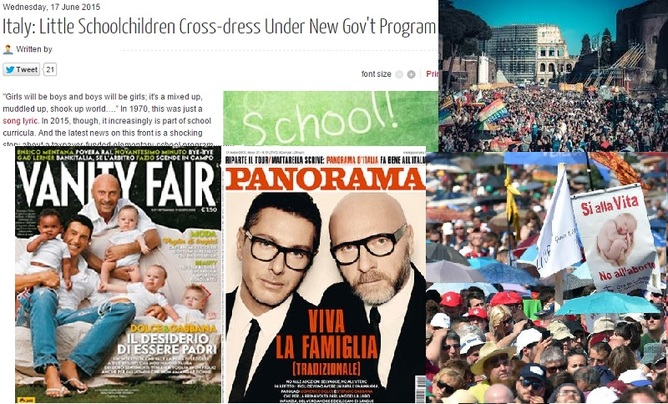
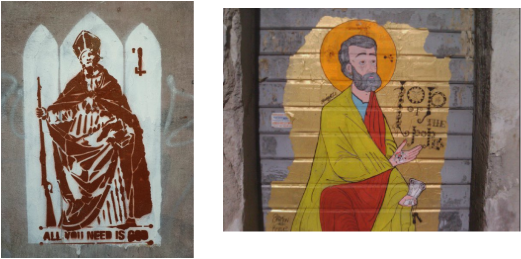


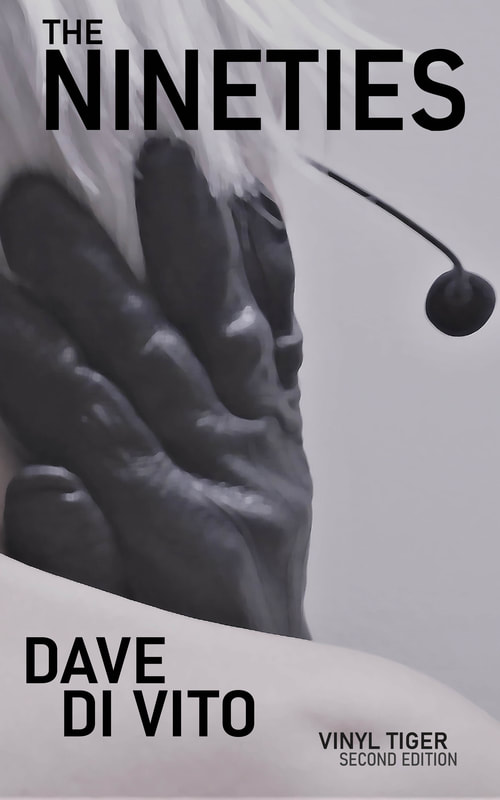

 RSS Feed
RSS Feed